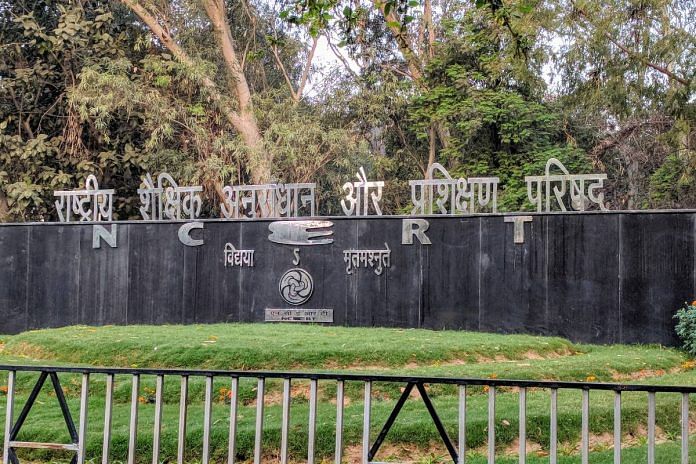New Delhi: Pointing out that changes in the school textbooks brought in by the National Council of Educational Research and Training (NCERT) for the 2023-24 academic year starting Monday were made without consultation with experts who have worked on NCERT textbooks in the past, over 250 historians, including Romila Thapar and Jayati Ghosh, issued a public statement Friday, condemning the move and demanding that the deletions be withdrawn. They also alleged that the changes were against India’s constitutional ethos.
The statement issued late Friday was signed by academics from various educational institutions, including Jadavpur University, Jawaharlal Nehru University, Delhi University, Ashoka University and the University of Amsterdam, among others.
“We are appalled by the decision of the NCERT to remove chapters and statements from the history textbooks and demand that the deletions be withdrawn. The decision of the NCERT is guided by divisive motives. It is a decision which goes against the constitutional ethos and composite culture of the Indian subcontinent. As such, it must be rescinded at the earliest,” the statement said.
Victoria Potshangbam from Kamala Nehru College in DU, Maya John from Jesus & Mary College, Mukul Mangalik, retired professor from Ramjas College, among others, have also signed the letter. Many of the signatories have worked on NCERT syllabus in the past.
“There has been no attempt to consult members of the teams that had prepared the textbooks, which included historians and school teachers, apart from members of the NCERT,” the statement said.
Books for the 2023-24 academic year were released by the NCERT after a syllabus pruning exercise, meant to ease the pressure on students in light of the academic upheavals caused by Covid-19, as well as in line with the National Education Policy 2020.
The changes include deletions from history textbooks, such as that of an entire chapter on Mughal history, references to caste and inequality, mention of 2002 Gujarat riots, and a portion about Mahatma Gandhi’s life and his assassination by Nathuram Godse.
The historians in their statement have, however, alleged that NCERT’s decision to use the Covid-lockdown period to argue that there was a need to lighten the burden was “contentious”.
“They have used it to drop topics like the history of the Mughal courts, the 2002 communal riots in Gujarat, the Emergency, mention of Dalit writers, the Naxalite movement, and the fight for equality from social science, history, and political science textbooks of classes 6-12,” read the statement.
Claiming that the new editions of these NCERT books have simply made the deletions the norm, the statement said this has been done “even when we are in a post-pandemic context in which school education has limped back to normalcy and is no longer in the online mode”.
The statement added: “As such, removing chapters/sections of chapters is highly problematic not only in terms of depriving learners of valuable content, but also in terms of the pedagogical values required to equip them to meet present and future challenges.”
Also Read: Congress to BJP, Ambedkar cartoons to 2002 riots, NCERT syllabus’ run-in with political axe
‘Driven by agenda’
The historians in their statement added that the revision should have only been done “in sync with the consensus of the existing historical scholarship. However, the selective deletion in this round of textbook revision reflects the sway of divisive politics over pedagogic concerns.”
They added that the chapter on Mughals — ‘Kings and Chronicles: The Mughal Courts (c. sixteenth-seventeenth centuries) — has been deleted from history textbooks “driven by an agenda”.
“In medieval times, the Mughal and the Vijayanagara were two of the most important empires in the Indian subcontinent, both of which were discussed in the previous textbooks. In the revised version, while the chapter on the Mughals has been deleted, the chapter on the Vijayanagara Empire has been retained,” the statement said.
The exclusion exposes the wider communal undertones, based on an inaccurate assumption about India’s past — that the religion of the rulers was the dominant religion of the times, the statement added.
The statement also said that “removing entire periods of history from history textbooks would not only perpetuate misconceptions and misunderstandings but would serve to further the divisive communal and casteist agenda of the ruling elites.”
On Wednesday, National Council of Educational Research and Training (NCERT) director Dinesh Saklani had responded to allegations that certain portions about Mahatma Gandhi were surreptitiously deleted from Class 12 textbooks.
Speaking to ThePrint, Saklani had said the deletions were left out of the list on account of a possible “oversight”, and there was no intention to hide it from the public. He, however, said there is no chance that the council will restore the deletions because they were made on an expert committee’s opinion.
(Edited by Richa Mishra)
Also Read: Want to use science to standardise testing & scoring in India: CEO of body behind GRE, TOEFL



